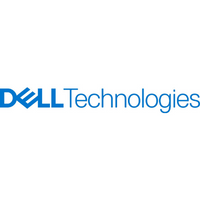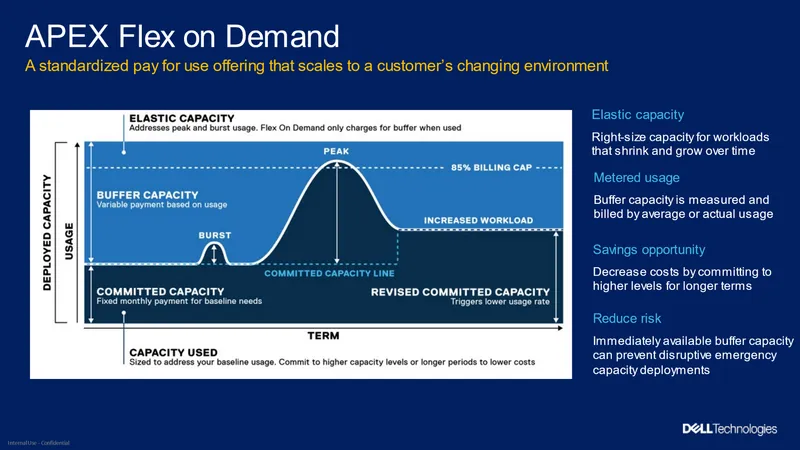
Dell Technologies
View Brand PublisherAdopt flexible usage-based consumption solutions for elastic capacity and cost efficiency
A flexible consumption-based model ensures that businesses are paying only for what they need, thus helping them save costs, reduce risks, and adjust to changing business environments.
Today’s fast-paced business environment requires the immediate availability of tech solutions at scale. This requires businesses to accurately predict technology costs and productivity curves that will justify infrastructure and technology investments, which may not be something all companies can do. This demands an elastic capacity to help customise software and hardware solutions that work best for the company.
Companies also do not want to pay for tools and resources that they do not need at full capacity. However, several offerings demand an upfront payment, which does not allow any wiggle room in case of reduced usage or increased capacity requirement.
Alternatively, adopting public cloud for these technologies has helped businesses fulfil their initial needs, however, proving to be expensive and unmanageable in the long run.
This is why a consumption-based offering within your data centre is an attractive option for companies looking to reduce costs and optimise performance because you only pay for technology as you use it.
Why is a consumption-based solution ideal?
Consumption-based pricing solutions allow flexibility to quickly change to business needs, prevent unnecessary costs and enable businesses to grow faster, In comparison, an upfront payment requirement is not ideal because it is difficult to procure for many companies, particularly startups for the following reasons:
- They need to have the necessary CapEx funds.
- They need to make maintenance, lifecycle management, and retirement decisions by themselves, which can incur additional costs.
- They need to have a clearly projected growth trajectory and follow it consistently without a hitch because they would have acquired assets according to that.
Because of startups’ unpredictable and inconsistent nature of growth, they may be forced to purchase excess capacity upfront, pay for the technology they may not even use, and have no buffer capacity if they were to exceed their growth projections, or worse, not be able to buy the right technology because it is unaffordable. Failing to achieve their projected goals could lead to them incurring losses as they would have already paid for the infrastructure, risking a lack of funds for other critical projects.
Dell Technologies APEX Flex on Demand
Dell Technologies APEX Flex on Demand is a consumption-based offering, unlike most services and assets that require an upfront payment. APEX FOD follows a pay-per-use model, where businesses are charged only based on what they want to use, and this is pre-arranged on a contractual basis which can be fixed for a minimum of 12 months to a maximum of 5 years.
Customers can access any product offerings within Dell Technologies such as storage, servers, converged and hyper-converged infrastructure, and data protection services as part of the FOD solution. However, the commitment thresholds differ for each offering, ranging from a minimum commitment capacity of 40% for Storage and Data Protection to a minimum capacity of 70% for Servers.
APEX FOD offers an elastic capacity which ensures that, with increased workloads over time, companies have a buffer capacity above their committed capacities. They will pay for the buffer capacity based on usage at the same pre-arranged rate drawn up in the contract.

Source: Dell Technologies
Suppose a company commits to consume 50% of resources, they will follow a pay-per-unit amount as agreed upon with Dell Technologies. By committing to higher capacity levels, they will decrease long-term costs, leading to better savings and reduced risks.
As the assets remain in Dell Technologies’ name, businesses do not have the burden of carrying in their books, depreciation, and so on. The equipment will be deployed at the business’s data centre premises or colocation facility of their choice, and be dedicated for their consumption for the contract period from day one.
How will APEX FOD benefit you?
- Flex on Demand allows the installation of technology solutions that you need now and in the future, the usage of which will be measured by automated tools installed in the equipment.
- You can ensure simple ordering and lifecycle management via APEX Console.
- You get to choose your total deployed capacity and minimum usage commitment. You can start as low as 40%, unlike traditional 100% upfront payment or much higher (70% or more) from other vendors. allowing you to consume the best technology and start small with Dell Technologies.
- At the end of the usage term, you can extend the term or return and refresh equipment.
- There is flexibility to expand your contract. You can increase your committed capacity from 50% to something higher at the same rate per unit.
- Pay flexibly with a fixed cost for committed capacity and buffer capacity.
- A billing cap of 85% ensures there are no charges for capacity usage over 85% of total capacity.
- Dell APEX FOD also ensures that resources will be reserved in your data centre of choice for the entire contract period and not be taken back if they are underutilised, unlike alternate solutions in the market.
- You will have lower usage charges and thus save better by selecting higher levels of committed capacity and longer usage periods as workloads increase beyond the initial committed capacity.
If you are looking to scale up, make the most of what Dell for Startups has to offer.







